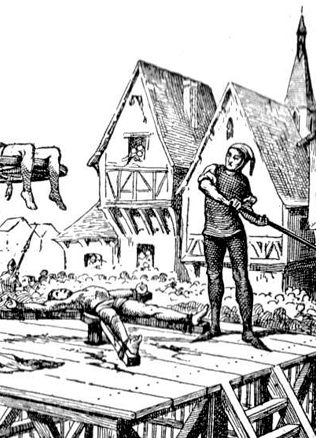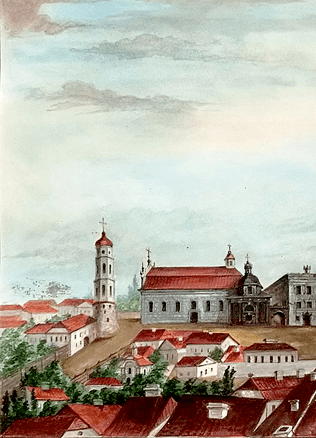The Perception of Honour
In the 17th century, honour was the most valued asset among the nobility of the Grand Duchy of Lithuania, just like in many other European countries. Honour was perceived as an impeccable reputation of a person and of his or her family, house, country, nation etc. The reputation could be damaged by saying, writing or doing something or in any other form that a person considered offensive. Representatives of the nobility would defend their honour in duels although not as often as in Western countries despite that article 14 of the 11th chapter of the Third Lithuanian Statute banned duels as a detrimental custom. It was only in exceptional cases that duels could be allowed by the king or, for conflicts in the army, by the Grand Hetman. Anyone challenging a person to a duel or agreeing to take part in a duel or wounding an opponent would face a fine and imprisonment while death penalty was the most severe punishment for killing an opponent in a duel. The king offered his personal protection to those refusing to take part in duels; people were encouraged to sue the initiators of duels for insult and attempted murder.
The noble code of duelling
Despite that, honour was an extremely sensitive area for every representative of the nobility. Far from every conflict would end up in a duel because often it was enough for a nobleman to demand satisfaction in a subtle way. The letter by duke Bogusław Radziwiłł, notorious for his passion for duels, is an example of such behaviour. Radziwiłł wrote the letter at the end of his life (on the 1st of July 1669) to Krzysztof Pac, the Chancellor of the Grand Duchy of Lithuania: “Inasmuch as Your Grace (…) did not want to leave us in peace by restoring our honour that you had groundlessly affected and that is more valuable for us than health, we wish to defend it by means of weapon, something that both the Statute and the insulted honour allows us to undertake [?!]. Hence we invite Your Grace and the graceful nobleman from Vilnius [Michał Kazimierz Pac] with this letter to arrive tomorrow at about four in the morning to the same place in the field between Gribov and Cherniakov horseback and armed in order to fight with pistols because both of you assaulted us unlawfully therefore Your Grace will duel with me while the graceful nobleman from Vilnius will fight with the graceful duke and Vice Chancellor [Michał Kazimierz Radziwiłł ]; every one of you should arrive with no more than five people because we will also arrive in fives, i. e. every one of us will wait for you in secret with four friends each of whom had given their knightly word and if anyone betrays us, he will lose his knightly honour; the aforementioned knights will only serve as witnesses; after receiving satisfaction we will remain Your propitious brothers if you wish so.”
Ordinary representatives of the nobility usually wasted no time for letters because they wanted quick and effective decisions. J. V. Poczobut Odlanicki, a Lithuanian nobleman and duel admirer, fought in a duel on the 15th of August 1660 while the Lithuanian army was waiting for a battle with Russians at the river of Basya, in the present-day Belarus, because he contested the respectable place in the list of the hussar regiment “with my fellow Kazimierz Juriewicz. We had a fierce fight with him and I would have defeated him with God’s grace after cutting off a piece of his sword handle but our regiment fellows who rushed to pull us apart and wished to chop me in pieces but were eventually stopped by soldiers from other regiments. That duel helped me maintain my place in the list as well as my good reputation among fellow soldiers who are my primary enemies.” One year later, on the 30th of November 1661, he fought in a duel again. “Krzysztof Szumski, a left-handed service fellow of mine, demanded satisfaction on the Saint Andrew’s Day although he was himself to blame.
I had a fight with him and hit his forehead once so that he even rolled over and was busy collecting small bones from his forehead afterwards.
The felt under his turban helped to save his brain from dripping around. Several fellows witnessed it and later testified that I had owed him nothing, I only wanted him to leave me in peace. He loathed me always and God does not love people like him because God renders [his grace] to the just one.”
Quarrels, fighting and duels were common in military camps where soldiers would spend days and weeks on end drinking and waiting for military action, according to the memoires of J. Pasek, a Polish nobleman, who had three duels with his fellow servicemen on that same evening after a party in the military camp in the spring of 1660 in the present-day Belarus. Apparrently, that was “a bad day because as much as fifteen duels took place on that day in different regiments.”
Burghers were keen to duel too
Burghers also took care about their honour, sometimes in duels but more often in street scuffles and courts. Wealthy merchant Daniel Hartman was invited to a wedding party in 1663 where he “berated and insulted with no reason” Jakub Desaus, another merchant from Vilnius. Daniel challenged him to a duel for tomorrow proposing a fight either with rapiers or with pistols on horseback. His opponent had a more sober idea “partly lead by his inherent wit and partly by God’s precepts and remembering the laws in force and the advices by people” of not giving his challenger a chance to fight. He sought satisfaction for his grievances and indignities by bringing Daniel to court instead.
Do You Know?
During the years of the Russian occupation, on the 17th of July 1658, resident of Vilnius named Jan Poradnicz filed a complaint against saddler Andrzej Harasimowicz who, in drunken condition and with no reason, “publicly and in front of other people put indignities upon him by swearing and shaming him with scathing words harmful to one’s fair honour and by saying that he was this and that, the son incepted in dishonesty and even calling his wife unclean and a witch.” The saddler later threatened him of sending someone to dispose of him. Soon a Russian soldier visited Jan and said that “the saddler gave me 30 kopeks to smear you and beat you up; give me more unless you wish to be beaten up and smeared.” Poradnicz however decided to go to the court.
Even during the years of the Muscovite occupation, the burghers of Vilnius would sometimes settle their quarrels with rapiers, a weapon considered befitting a noble.
People sometimes would consider even small domestic quarrels as offenses on their honour. A merchant from Vilnius filed a complaint to a court on the 9th of January 1659 against his brother-in-law, also a merchant, who according to the former insulted and defamed him in person and in public with no reason. In addition to that, his brother-in-law sent his servants who stole his firewood and this is why he asks for a court hearing. It was after the liberation of the city, on the 10th of December 1660, that a stepmother complained about the son of her late husband, a former burgomaster. According to the widow, her adopted son won’t let her into her husband’s home, he also “tongue-lashed and insulted her by using very offensive words that are detrimental to her honour; he also threatened her health and sought for a sword” and this is why she wants to bring him to court. Another stepmother filed a court complaint against her adopted son who “accuses me groundlessly and tarnishes me and his own father by calling his wife a villain. Smeared and accused of committing villainy she wants to bring her adopted son” to court. Quarrels and fighting for honour would sometimes take place among artisans too. The chief master of the guild of tailors wrote to court after the meeting of the guild held on the 10th of February 1659 that several tailors “insulted, swore and quarrelled” during the meeting. He feels the “verbal attempt to smear his honour by insult and libel” therefore he asks for a court hearing.
Some residents of Vilnius took care of the national pride as well. It was in 1662 that several Vilnius dwellers arrived to court to complain about a Polish nobleman named J. Ch. Pasek whom they fought with inside an abandoned house. According to them, “the most painful thing is that before leaving the house he wrote a verse on the wall that offends our nation.”
Literature: A. Ragauskas, Vilniaus miesto valdantysis elitas XVII a. antrojoje pusėje (1662–1702 m.), Vilnius, 2002, p. 402–403.
Elmantas Meilus



